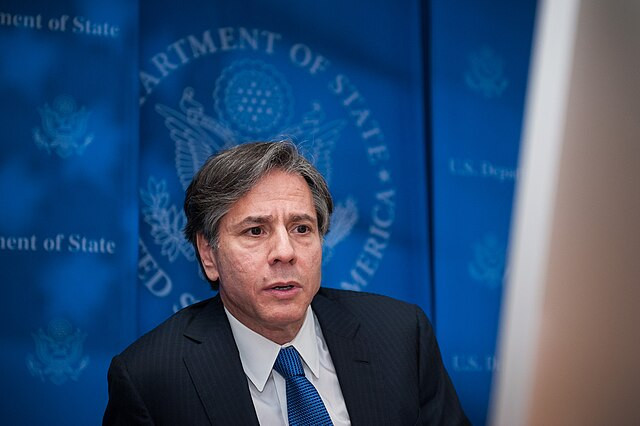U.S. Secretary of State Antony Blinken issued a stark warning on Monday, urging Israel and Hamas to seize what he called the "best, maybe the last" chance to negotiate a ceasefire and secure the release of hostages in Gaza. However, with escalating violence and hardened positions on both sides, the prospects for a breakthrough remain uncertain.
During a press conference in Tel Aviv, Blinken emphasized the urgency of the situation, stating, "This is a decisive moment, probably the best, maybe the last opportunity to get the hostages home, to get a ceasefire and to put everyone on a better path to enduring peace and security." His comments came ahead of meetings with Israeli President Isaac Herzog and Prime Minister Benjamin Netanyahu, where he reiterated the need for immediate action.
The push for a ceasefire comes amid heightened tensions, with Hamas announcing a return to suicide bombings inside Israel-a tactic not seen in years. On Sunday, a blast near a synagogue in Tel Aviv, claimed by Hamas and Islamic Jihad, resulted in the bomber's death and injuries to another person. Hamas declared that suicide bombings "will return to the forefront" as long as the Gaza conflict persists, underscoring the challenges facing diplomatic efforts.
Negotiations in Qatar, which resumed this week following a pause, have yet to yield significant progress. The U.S. has proposed a "bridging proposal" to address the impasse, but both Israel and Hamas remain entrenched in their positions. Hamas has accused Netanyahu of "thwarting the mediators' efforts," while Netanyahu, addressing his cabinet, maintained that Israel would not be in a position where it "just gives and gives" without securing its key demands.
Central to the stalled negotiations are disagreements over Israel's continued military presence in Gaza, particularly along the border with Egypt, the movement of Palestinians within the territory, and the identity and number of prisoners to be exchanged in any potential swap. Despite Blinken's optimism, both sides have signaled that reaching a deal will be difficult. Turkish officials, citing discussions with Hamas, suggested that U.S. officials may be "painting an overly optimistic picture" of the situation.
The conflict, which began on October 7 last year when Hamas militants launched an attack on Israeli communities, has resulted in devastating consequences for both sides. Israel's retaliatory military campaign has devastated large portions of Gaza, displacing nearly all of its 2.3 million residents, and causing a humanitarian crisis with widespread hunger, disease, and a reported death toll exceeding 40,000, according to Palestinian health authorities.
Adding to the humanitarian toll, the United Nations Relief and Works Agency (UNRWA) reported that 207 of its staff members have been killed since the conflict began. "They were engineers, teachers, medical staff. They were humanitarian workers," UNRWA said in a statement, highlighting the dire situation on the ground.
Blinken's visit comes at a time when U.S. President Joe Biden is facing growing domestic pressure over his handling of the conflict, particularly from Muslim and Arab-American communities. As the Democratic Party holds its national convention, concerns about securing these crucial voting blocs in swing states have become increasingly pronounced.
Meanwhile, senior Hamas official Sami Abu Zuhri dismissed Blinken's efforts, criticizing him for allegedly siding with Netanyahu. "Blinken acts as if he was a minister in Netanyahu's government," Zuhri told Reuters, casting doubt on the likelihood of the U.S. successfully brokering a deal.
Inside Gaza, the mood remains grim. Displaced Palestinians expressed skepticism about the potential outcomes of Blinken's visit. "They are lying just to destroy us more and more," said Hanan Abu Hamid, who was forced to flee her home in Rafah. "Kill us and kill our children, starve us and make us homeless. Blinken is useless, his visit will harm the Palestinian people."
The broader regional implications of the conflict also loom large. The war has already led to months of clashes between Israel and Hezbollah on the Lebanese border, raising fears of a wider escalation. Blinken underscored the risks, warning against provocations that could derail the fragile diplomatic process. "It's also time to make sure that no one takes any steps that could derail this process, and so we're working to make sure that there is no escalation, that there are no provocations," he said.
As Blinken met with Israeli leaders, the situation on the ground continued to deteriorate. Israeli forces advanced north of Khan Younis, cutting off critical access routes, while airstrikes in Gaza City and Nuseirat camp claimed more lives. In Khan Younis alone, eight Palestinians were reported killed in the latest wave of bombings.




